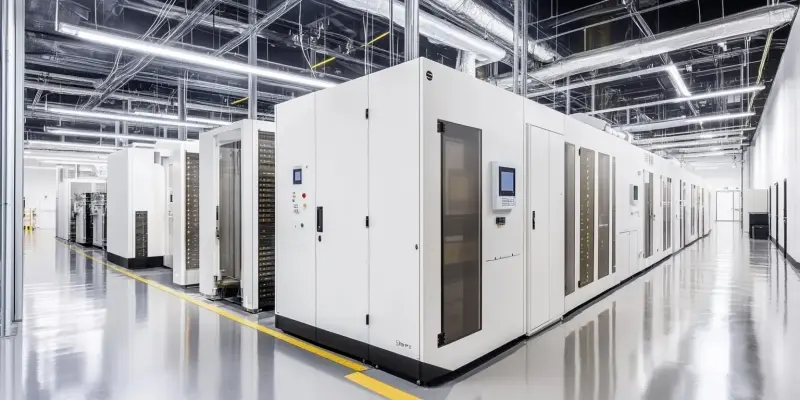As artificial intelligence (AI) continues to evolve at a rapid pace, the energy demands placed on server farms and data centers have increased to unprecedented levels. This surge in energy consumption necessitates sustainable solutions, sparking renewed interest in nuclear power, especially through innovative small modular reactors (SMRs).
The Energy Demands of AI and Data Centers
Advances in AI technology have marked a significant inflection point both technologically and societally, leading to a surge in energy demands from server farms and data centers. These infrastructures are essential for AI applications and now require extraordinary amounts of energy. In Ireland, the energy consumption projection is particularly alarming, with data centers expected to consume up to one-third of the country’s electricity by the end of the decade. This scenario underscores the urgent need for sustainable and reliable energy solutions to support the growing demands of AI.
In the United States, data centers already account for approximately 4 percent of the national electricity load. However, a December report by Grid Strategies predicts that this figure will at least double by 2030, constituting the majority of the anticipated 16 percent increase in national consumption. Leading cloud service providers in the U.S. are taking proactive measures to address this impending energy challenge. They are exploring alternative energy sources, with nuclear power emerging as a top choice due to its reliability and minimal carbon footprint.
Reinvestment in Nuclear Power by Leading Cloud Providers
Amid rising energy demands, leading cloud service providers are making substantial investments in nuclear power to ensure the sustainability of their operations. In March, Amazon acquired a data center near Berwick, Pennsylvania, accessing 300 MW from the nearby Susquehanna nuclear plant while circumventing the national grid. This strategic move highlights the growing interest in direct nuclear energy acquisition as a solution to the energy crisis facing the tech industry.
Similarly, in September, Microsoft partnered with Constellation Energy to recommission Unit 1 of the Three Mile Island nuclear plant in Pennsylvania. This partnership involves drawing 835 MW for its data centers over a 20-year period. This move is particularly noteworthy given the plant’s closure in 2019 due to commercial reasons and its infamous 1979 reactor accident. These initiatives by tech giants like Amazon and Microsoft underscore the pivotal role of nuclear energy in meeting the energy demands of AI-driven data centers while maintaining operational sustainability.
The Promise of Small Modular Reactors (SMRs)
Small modular reactors (SMRs) are at the forefront of the renaissance in nuclear energy, promising to revolutionize how power is generated and utilized. These reactors, each with a capacity of up to about 300 MW, are designed to be mass-produced and easily transported, offering unparalleled flexibility. They can be co-located in multiple units at a single site to meet varying capacity demands over time. The International Atomic Energy Agency (IAEA) notes that 25 countries are investing in SMR technology, with operational units already in place in Russia and China. Moreover, 68 additional designs are currently in development globally.
Tech giants have recognized the potential of SMRs and are making significant commitments in this area. In October, Google committed to a 500 MW agreement for a fleet of SMRs from Kairos Power by 2030. Shortly thereafter, Amazon led a $500 million investment in X-energy, which is developing an 80 MW gas-cooled SMR design. Additionally, OpenAI CEO Sam Altman has invested in Oklo, another Californian SMR start-up. Amazon is also collaborating with Dominion Power on an SMR initiative near the North Anna nuclear plant in Virginia, as well as with Washington State’s Energy Northwest utility for further SMR projects. These commitments highlight the growing recognition of SMRs’ potential to address the energy demands of AI-driven data centers.
Advantages and Challenges of SMRs
Proponents of SMRs argue that these reactors offer significant advantages over conventional nuclear plants in terms of cost-effectiveness and efficiency. Some SMR designs intend to utilize spent nuclear fuel from older plants, addressing concerns related to nuclear waste management. Additionally, most SMRs employ passive thermal management systems, which reduce the risks of thermal runaway or detonation. As a result, the substantial containment structures and elaborate cooling systems characteristic of traditional large-scale nuclear plants may be unnecessary for SMRs, leading to potential cost savings and increased safety.
However, despite their promise, several concerns surround SMR adoption. One of the primary issues is the potential increase in nuclear waste due to contamination from neutron leakage. This necessitates careful consideration of waste management strategies. Furthermore, the reduced containment structures and the proximity of SMR sites to population centers could make them attractive targets for terrorism and sabotage. Consequently, continuous armed security and robust anti-hacking measures are required to ensure the safety and security of SMR installations. Addressing these challenges is crucial for the successful deployment and acceptance of SMRs as a sustainable energy solution.
The Future of Nuclear Energy in Ireland
With the rapid advancement of artificial intelligence (AI), the energy demands on server farms and data centers are hitting unprecedented levels. This significant increase in energy consumption emphasizes the urgent need for sustainable solutions to support this growth. As we seek these solutions, nuclear power has regained attention, particularly through the development of innovative small modular reactors (SMRs). These advanced SMRs are designed to be more efficient and safer than traditional nuclear reactors, offering a potential fix to the escalating energy needs. With their modular design, they can be constructed more quickly and positioned closer to data centers, reducing transmission losses and providing a reliable, clean energy source. Given the pressing environmental challenges and the need to limit carbon emissions, SMRs represent a viable and sustainable option that aligns with both technological growth and environmental stewardship. Their capacity to provide a steady supply of power makes them a promising candidate to support the immense energy requirements of AI-driven operations in a sustainable manner.

